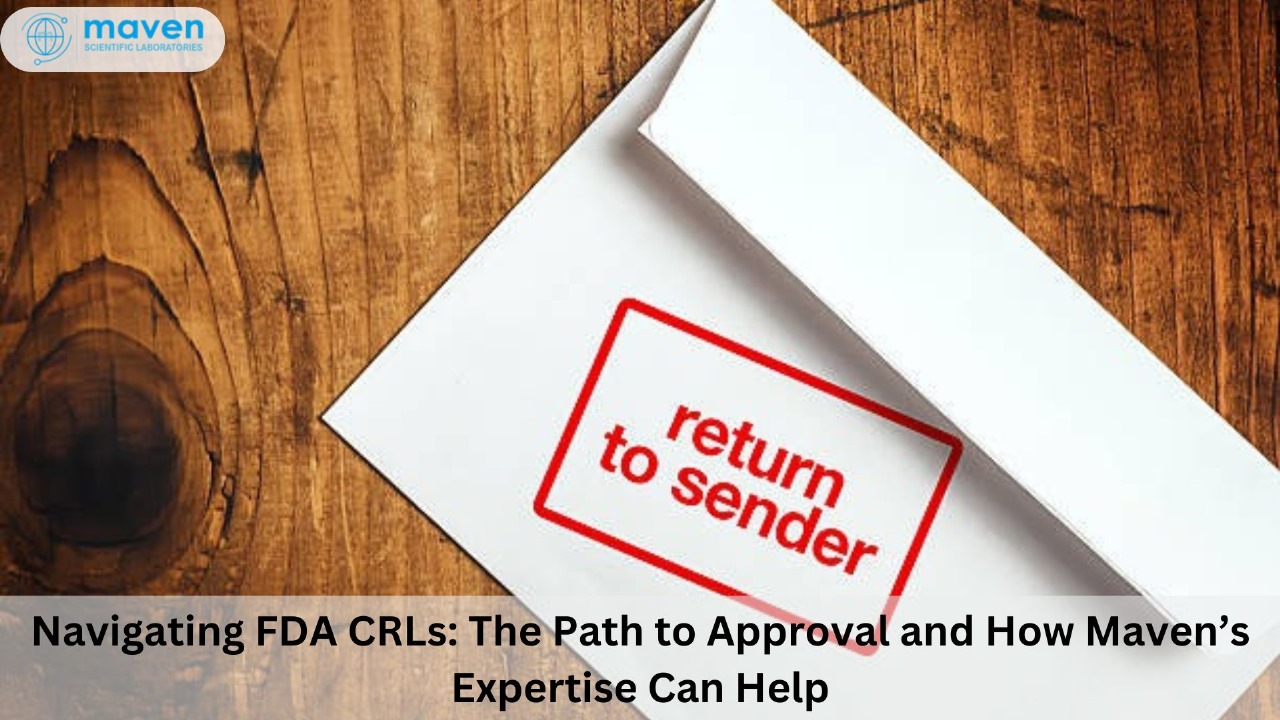
Navigating FDA CRLs: The Path To Approval And How Maven’s Expertise Can Help
In the world of drug development, receiving a Complete Response Letter (CRL) from the FDA can seem daunting. However, a CRL is not the end of the road—it’s an opportunity to address deficiencies and improve your application. Whether related to clinical data, toxicology issues, or manufacturing concerns, a CRL signals the need for course correction, not rejection.
Understanding the CRL Process
When the FDA issues a CRL, it provides feedback on why a New Drug Application (NDA), Abbreviated NDA (ANDA), or Biologics License Application (BLA) was not approved in its current form. While the letter outlines deficiencies, it also offers guidance on resolving issues and resubmitting. Resubmissions are classified based on the severity of issues:
- Class I Resubmission: Minor deficiencies with a two-month review period.
- Class II Resubmission: Major deficiencies with a six-month review period.
Each type of resubmission requires a tailored strategy and a precise understanding of the corrective actions necessary.
Common Reasons for CRLs
- Clinical Deficiencies: Inadequate clinical trial designs, insufficient patient enrolment, or unconvincing efficacy data.
- Toxicology Issues: Incomplete safety profiles, insufficient toxicological data, or discrepancies in study methodologies.
- Manufacturing Concerns: Non-compliance with current Good Manufacturing Practices (cGMP), inconsistent production processes, or quality control failures.
- Regulatory Documentation Errors: Missing or inconsistent data, poor data integration, or failure to adhere to regulatory guidelines.
Understanding the root causes of these deficiencies is critical for a successful resubmission.
Maven’s Expertise: A Crucial Resource in Responding to CRLs
Responding to a CRL is a critical moment in the drug development process. Success depends heavily on a sponsor’s ability to accurately identify deficiencies, address them comprehensively, and meet the FDA’s stringent regulatory standards. This is where Maven’s expertise in toxicology and regulatory affairs becomes invaluable.
1. Toxicology Expertise: Ensuring Safety Data Meets FDA Standards
One of the most common reasons for CRLs is safety concerns, such as insufficient or incomplete toxicology data. Maven’s toxicology team specializes in addressing these deficiencies effectively.
How Maven Helps:
- Preclinical and Clinical Toxicology Studies: Maven designs and oversees acute, chronic, reproductive, safety pharmacology, and genotoxicity studies to meet Good Laboratory Practices (GLP) and FDA guidelines.
- Risk Assessment: By thoroughly evaluating a drug’s benefit-risk ratio, Maven refines dose escalation protocols, modifies clinical trial designs, or identifies safer formulations to address FDA concerns.
- Regulatory Compliance: Maven ensures toxicology data adheres to FDA guidelines, minimizing the risk of further CRLs due to safety-related deficiencies.
2. Regulatory Strategy & Guidance: Decoding the CRL and Structuring the Resubmission
Interpreting the FDA’s feedback and addressing deficiencies effectively can be overwhelming. Maven’s regulatory experts break down the CRL into actionable steps.
How Maven Helps:
- Decoding the CRL: Maven simplifies the FDA’s feedback, helping sponsors understand the root causes of deficiencies and the exact corrective actions required.
- Adherence to Guidelines: Maven ensures compliance with evolving FDA regulations, revising clinical trial protocols and updating documentation to address flagged issues.
- Strategic Resubmission Planning: Maven creates a resubmission roadmap, advising on timing, additional data needs, and compliance with cGMP.
- FDA Communication: Maven facilitates clear communication with the FDA to expedite feedback and approvals.
3. Data Integration and Presentation: Ensuring Clarity and Consistency
Incomplete or inconsistent data is a frequent issue in CRLs. Maven ensures that resubmissions are scientifically rigorous and well-presented.
How Maven Helps:
- Data Integration: Maven integrates new findings with existing data to present a cohesive narrative addressing deficiencies.
- Clear Presentation: By summarizing complex data with detailed tables, figures, and concise narratives, Maven ensures submissions meet FDA expectations.
- Scientific Rigor: Maven guarantees studies are methodologically sound and aligned with FDA standards for scientific integrity.
4. Timely Resubmission: Managing Deadlines and Preparing for Review
Resubmissions must adhere to FDA timelines based on the classification of the CRL (Class I or Class II). Maven helps sponsors stay on track with deadlines while maintaining quality.
How Maven Helps:
- Project Management: Maven creates detailed timelines for addressing deficiencies, ensuring readiness for FDA review.
- Streamlined Processes: By focusing on critical issues, Maven helps sponsors prioritize resources effectively.
- Regulatory Tracking: Maven monitors the resubmission process, ensuring all requirements are met and delays are minimized.
Case Study: Maven’s Role in Navigating a CRL
Background: A mid-sized pharmaceutical company received a Class II CRL for their NDA submission. The FDA cited deficiencies in preclinical toxicology data, specifically gaps in reproductive toxicity studies and an unclear safety margin.
Challenges:
- The sponsor needed to conduct additional studies within a limited timeframe.
- The CRL required clarification on dosing protocols and revisions to safety data integration in the application.
Maven’s Approach:
- Toxicology Expertise: Maven designed and managed reproductive toxicity studies that adhered to GLP standards, ensuring all gaps were addressed.
- Risk Assessment: The team conducted a detailed benefit-risk analysis, refining dosing protocols to align with FDA expectations.
- Data Integration: Maven updated the safety data summary and integrated new findings with existing reports, creating a cohesive and scientifically sound presentation.
- Regulatory Strategy: Maven collaborated with the FDA, organizing a pre-resubmission meeting to clarify expectations. The resubmission plan was aligned with FDA guidance, reducing the likelihood of additional deficiencies.
Outcome: The resubmission was accepted, and the drug received FDA approval within six months of addressing the CRL, enabling the sponsor to launch their product on time.
Maximizing Chances of Success After a CRL
A CRL is not a rejection but an opportunity to strengthen your application. Maven’s toxicology and regulatory expertise provides sponsors with the tools to address deficiencies, ensuring resubmissions meet FDA standards. From designing studies to regulatory strategy and project management, Maven empowers sponsors to turn a CRL into a pathway for approval.
With Maven’s guidance, sponsors can confidently navigate the CRL process, transforming challenges into opportunities and ultimately bringing innovative therapies to market.
Need help navigating your FDA CRL? Contact Maven today and let our team of experts guide you toward approval!







